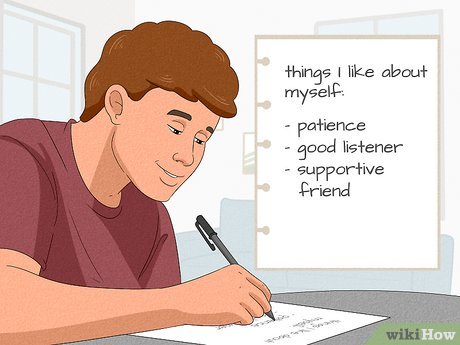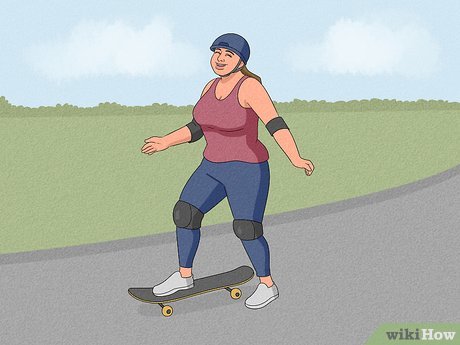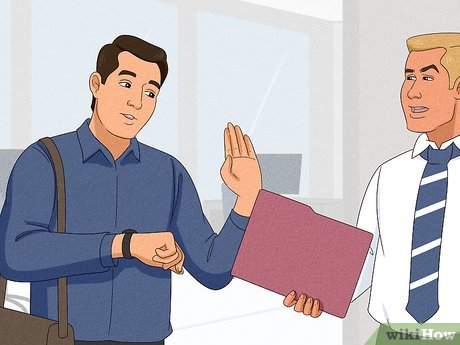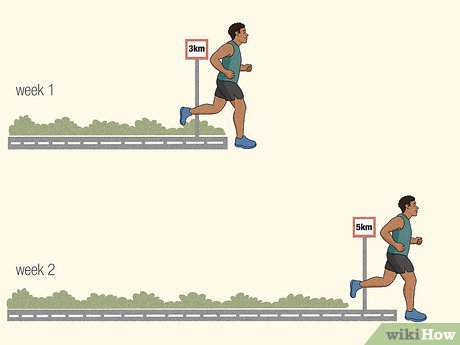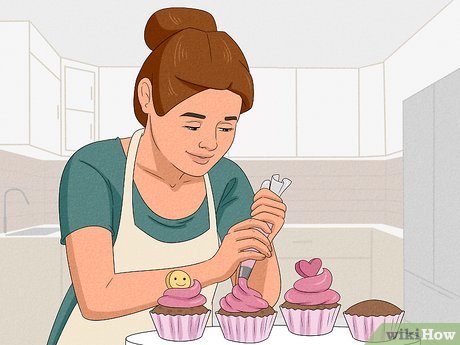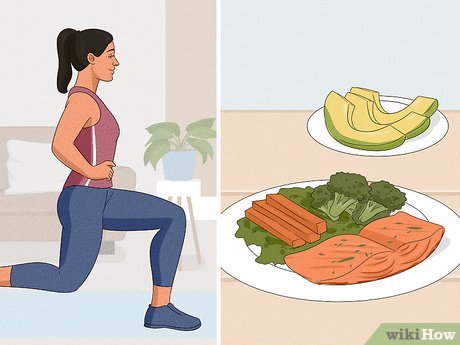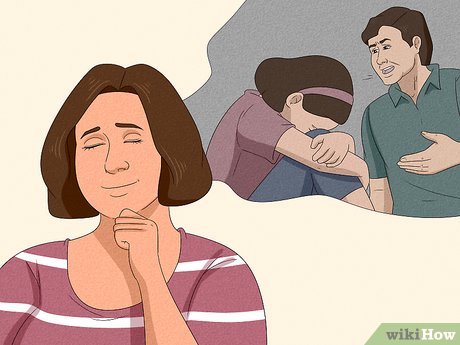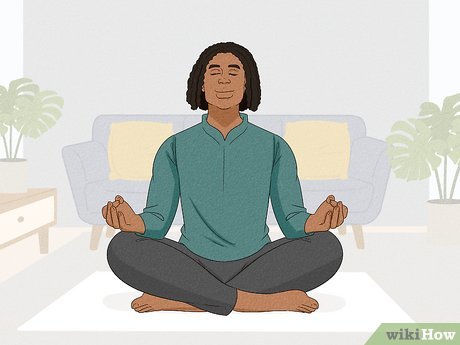This article was written by Kim Chronister, PsyD and by wikiHow staff writer, Jennifer Mueller, JD. Dr. Kim Chronister is a Licensed Clinical Psychologist. She specializes in helping people struggling with substance abuse, relationship problems, eating disorders, and personality disorders. Dr. Chronister has contributed to and appeared on Access Hollywood, Investigation Discovery, and NBC News. She is the author of “Peak Mindset” and “FitMentality.” She holds an MA in Clinical Psychology and a Doctor of Psychology (PsyD) from Alliant International University.
There are 10 references cited in this article, which can be found at the bottom of the page.
This article has been fact-checked, ensuring the accuracy of any cited facts and confirming the authority of its sources.
This article has been viewed 437,924 times.
If you're struggling with low self-esteem, you're not alone. Many people have a negative opinion of themselves and the truth is that your self-esteem might be at different levels from day to day or in response to things that happen to you. But it turns out there are actually some pretty simple ways to give yourself a boost. Read on to discover some simple ways to improve your self-esteem and the way you think about yourself.
This article is based on an interview with our licensed clinical psychologist, Kim Chronister. Check out the full interview here.
Things You Should Know
- Repeat a positive mantra or affirmation to boost your self-esteem, such as "I am valuable and worthy."
- Make a list of your accomplishments and the things you like about yourself. Refer to that list any time you're feeling down for a quick boost.
- Avoid comparing yourself to others. You're on your own journey and you're moving at your own pace.
Steps
Expert Q&A
-
QuestionHow can I feel attractive and confident?
 Chloe Carmichael, PhDChloe Carmichael, PhD is a Licensed Clinical Psychologist who runs a private practice in New York City. With over 12 years of psychological consulting experience, Dr. Chloe specializes in relationship issues, stress management, self-esteem, and career coaching. She has also instructed undergraduate courses at Long Island University and has served as adjunct faculty at the City University of New York. Dr. Chloe completed her PhD in Clinical Psychology at Long Island University in Brooklyn, New York, and her clinical training at Lenox Hill Hospital and Kings County Hospital. She is accredited by the American Psychological Association and is the author of “Nervous Energy: Harness the Power of Your Anxiety” and “Dr. Chloe's 10 Commandments of Dating.”
Chloe Carmichael, PhDChloe Carmichael, PhD is a Licensed Clinical Psychologist who runs a private practice in New York City. With over 12 years of psychological consulting experience, Dr. Chloe specializes in relationship issues, stress management, self-esteem, and career coaching. She has also instructed undergraduate courses at Long Island University and has served as adjunct faculty at the City University of New York. Dr. Chloe completed her PhD in Clinical Psychology at Long Island University in Brooklyn, New York, and her clinical training at Lenox Hill Hospital and Kings County Hospital. She is accredited by the American Psychological Association and is the author of “Nervous Energy: Harness the Power of Your Anxiety” and “Dr. Chloe's 10 Commandments of Dating.”
Licensed Clinical Psychologist Set small goals that you know you can accomplish. If you choose not to do those things, take ownership of that decision. Meeting your goals is a step forward, but deciding not to meet them, and owning that decision is also a half-step forward. You'll realize that you are in the driver's seat, and you can decide whether you're more comfortable now or when you reach your goals.
Set small goals that you know you can accomplish. If you choose not to do those things, take ownership of that decision. Meeting your goals is a step forward, but deciding not to meet them, and owning that decision is also a half-step forward. You'll realize that you are in the driver's seat, and you can decide whether you're more comfortable now or when you reach your goals. -
QuestionHow can I be happy?
 Moshe Ratson, MFT, PCCMoshe Ratson is the Executive Director of spiral2grow Marriage & Family Therapy, a coaching and therapy clinic in New York City. Moshe is an International Coach Federation accredited Professional Certified Coach (PCC). He received his MS in Marriage and Family Therapy from Iona College. Moshe is a clinical member of the American Association of Marriage and Family Therapy (AAMFT), and a member of the International Coach Federation (ICF).
Moshe Ratson, MFT, PCCMoshe Ratson is the Executive Director of spiral2grow Marriage & Family Therapy, a coaching and therapy clinic in New York City. Moshe is an International Coach Federation accredited Professional Certified Coach (PCC). He received his MS in Marriage and Family Therapy from Iona College. Moshe is a clinical member of the American Association of Marriage and Family Therapy (AAMFT), and a member of the International Coach Federation (ICF).
Marriage & Family Therapist Motivate yourself to pursue your passions and push yourself to your limits. If you tap into your inner resources, you'll start to recognize your qualities and values. It's a process, but over time, this will improve your happiness and self-confidence!
Motivate yourself to pursue your passions and push yourself to your limits. If you tap into your inner resources, you'll start to recognize your qualities and values. It's a process, but over time, this will improve your happiness and self-confidence! -
QuestionHow can I increase my self worth?
 Moshe Ratson, MFT, PCCMoshe Ratson is the Executive Director of spiral2grow Marriage & Family Therapy, a coaching and therapy clinic in New York City. Moshe is an International Coach Federation accredited Professional Certified Coach (PCC). He received his MS in Marriage and Family Therapy from Iona College. Moshe is a clinical member of the American Association of Marriage and Family Therapy (AAMFT), and a member of the International Coach Federation (ICF).
Moshe Ratson, MFT, PCCMoshe Ratson is the Executive Director of spiral2grow Marriage & Family Therapy, a coaching and therapy clinic in New York City. Moshe is an International Coach Federation accredited Professional Certified Coach (PCC). He received his MS in Marriage and Family Therapy from Iona College. Moshe is a clinical member of the American Association of Marriage and Family Therapy (AAMFT), and a member of the International Coach Federation (ICF).
Marriage & Family Therapist Your self confidence and happiness is very related to showing appreciation for what you have. Try to recognize your goodness and values in life. From there, take small steps to push your limits and boundaries to be a great person. Working on yourself can help you gain self confidence.
Your self confidence and happiness is very related to showing appreciation for what you have. Try to recognize your goodness and values in life. From there, take small steps to push your limits and boundaries to be a great person. Working on yourself can help you gain self confidence.
Video
Reader Videos
Tips
References
- ↑ https://health.clevelandclinic.org/how-to-improve-self-esteem/
- ↑ https://www.healthdirect.gov.au/self-esteem
- ↑ https://www.weber.edu/CounselingCenter/self-esteem.html
- ↑ https://health.clevelandclinic.org/how-to-improve-self-esteem/
- ↑ https://health.clevelandclinic.org/how-to-improve-self-esteem/
- ↑ https://www.mayoclinic.org/healthy-lifestyle/stress-management/in-depth/assertive/art-20044644
- ↑ https://www.psychologytoday.com/us/blog/off-the-couch/202301/how-do-you-recover-from-a-blow-to-your-self-esteem
- ↑ https://www.psychologytoday.com/us/blog/fixing-families/202208/5-steps-increasing-your-self-esteem-and-confidence
- ↑ https://www.healthdirect.gov.au/self-esteem
- ↑ https://www.betterhealth.vic.gov.au/health/healthyliving/self-esteem
- ↑ https://kidshealth.org/en/parents/boost-self-esteem.html
- ↑ https://www.dhs.gov/employee-resources/news/2022/07/05/improve-your-self-esteem
- ↑ https://health.clevelandclinic.org/how-to-improve-self-esteem/
- ↑ https://www.ncbi.nlm.nih.gov/pmc/articles/PMC8808471/
- ↑ https://www.betterhealth.vic.gov.au/health/healthyliving/self-esteem
About This Article
To improve your self-esteem, use hopeful statements, like “Even though this is a challenge, I can handle it.” Additionally, set realistic goals and expectations for yourself so you can feel a sense of accomplishment. You should also take care of yourself by eating well and exercising, which can boost your self-esteem by releasing the "happy chemicals" known as endorphins. As you work on building your confidence, try to avoid comparing yourself to others. Instead, focus on your own accomplishments and how you can better yourself. To learn how to increase your self-esteem by being your own best cheerleader, keep reading!
Reader Success Stories
-
 "This article helped me to understand that we all are unique and beautiful. Even if you don't have problems with your self esteem, you should remember this and keep working and developing!"..." more
"This article helped me to understand that we all are unique and beautiful. Even if you don't have problems with your self esteem, you should remember this and keep working and developing!"..." more

